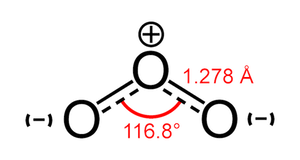-
Ozone and UV Sanitizers: What You Need to Know
- Posted on May 3, 2017
- by Christian Bonawandt
- in Blog
- No Comments.

Ozone molecule. Photo courtesy Wikimedia Commons.
The rising interest in ozone and UV sanitizers has been a hot topic among swimming pool professionals. The technology has been around a long time but is finally reaching the point of affordability for homeowners to use on high-end residential pools. If you’re thinking of putting a pool in your backyard or would like to upgrade your equipment to something state-of-the-art, you may want to consider using one or both of these systems. Before you do, however, you need to know a few things.
Next-Level Disinfection
Ozone and UV sanitizer systems kill bacteria in your pool. More importantly, they eliminate bacteria that chlorine can’t. While most of the bacteria, viruses and protozoa that ends up in your pool will be killed by chlorine, there are some that are highly resistant. That’s where ozone and UV sanitizers come in.
Ozone systems turn regular oxygen molecules (O2) into ozone (O3). Ozone is incredibly reactive and will strike down most bacteria in its quest to turn back to O2. The ozone is produced in what’s called a sidestream. A sidestream means that some of the water – between 15% and 25% – is directed away from the main flow. This happens after the water goes through the filter and heater but before it reaches the chlorinator.
UV systems are even simpler. A high-intensity lamp produces UV radiation that destroys the DNA of any microorganisms, preventing them from reproducing and becoming a health hazard.
Not a Chlorine Replacement
As good as these systems are, they are not a replacement for chlorine. What they can do is allow homeowners to reduce the level of chlorine to about from about 3 parts per million to 1 parts per million. This is the same level of chlorine found in salt water pools. So if you’re looking to avoid using chlorine in your pool altogether, this is not the solution; in fact, to date there is no true alternative to chlorine. Using an ozone or UV system, however, can reduce the need to “chlorine shock” your pool, as well as provide a superb secondary defense against illnesses and algae.
“The great thing about these systems is that neither adds a new chemical to your pool,” says Craig Bonawandt, co-owner of Haven Pools. “In fact, you can use them together to get the best-level sanitation available and avoid the need to add emergency chlorine or other chemical sanitizers down the road.”
Recent Comments
Archives
- May 2017 (1)
- November 2016 (1)
- October 2016 (1)
- August 2016 (1)
- July 2016 (1)
- February 2016 (1)
- July 2015 (1)
- May 2015 (1)
- April 2015 (1)
